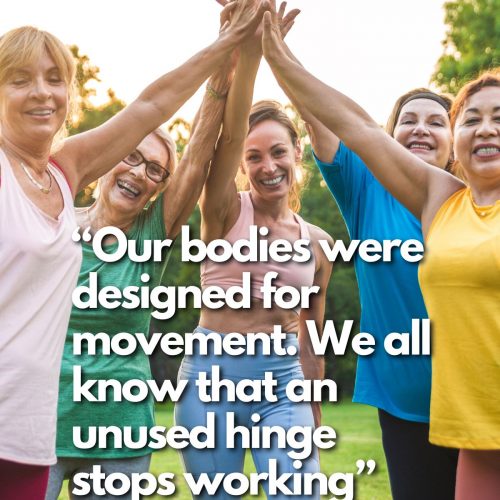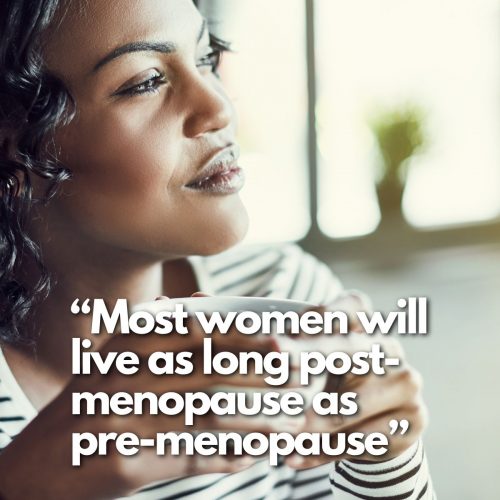What will be your lifespan? What about your healthspan? Do you know the difference between the two?

In our quest for a fulfilling and vibrant life, we often focus on increasing our lifespan, meaning staying alive for longer. But does anyone want a long life filled that is filled with chronic disease, pain and discomfort?
I suspect no.
THE DIFFERENCE
Lifespan is defined as the number of years you live.
Health span is defined as the number of years lived in good health and free from diseases.
As we pass 50, we need to shift our goals from merely extending the number of years we live to maximizing the quality of those years.
Lifespan and health span are very different concepts, and the gap between the two can be massive.
Over the past decades, medical science has contributed to an increase in lifespan. For example, in 1960 the average age for women in the U.S. was 73, and as of 2023, this figure increased to 80. We’ve gained an extra 7 years – HOORAY!
This is good news, right? Or is it?

It is estimated that between 2015 and 2030, the number of new cancer cases diagnosed will increase by about 40%. A report published in BMJ Oncology has pointed out that many of the reasons behind this increase are within our control: poor diets and increased consumption of processed foods, alcohol, smoking/vaping, lack of physical movement and obesity rate high on the list of factors.
The reality is that a longer lifespan means nothing if those extra years are filled with discomfort.
We can fight these trends by focusing on our HEALTH SPANS and taking the actions that we know will make our lives longer and more enjoyable.
YOUR HEALTH SPAN
Your health span is a reflection of your overall well-being. It includes your physical, mental, and emotional health, and our goal should be to extend this period of good overall health, making sure that we not only live longer but also lead healthier, happier lives.
According to the World Health Organization, approximately 12.5% of the global population is aged 60 or older, and this percentage is expected to increase to 22% by 2050. While the proportion of seniors is rising, the key question is how many of them are enjoying good health past the age of 50?

Statistics reveal that while a significant number of seniors do experience positive health outcomes, many do not.
According to a study published in the Journal of Aging and Health, a whopping 60% of those over 50 reported that they were “not enjoying good health”. That is a HUGE number. But not surprising given the many chronic diseases that come with age, such as arthritis, cardiovascular diseases, and diabetes.
DO WE NEED SOME GOOD NEWS NOW?!
Yes, we do! Research has concluded that only 30% of our health outcomes are related to genetics with the remaining being the result of external factors. So let’s take a look at these factors.
Factors Affecting Our Health
- Medical care: 10% to 20%
- Behaviour: 40% to 50%
- Physical environment: 20%
- Genetics: 30%
From this we see that there is a strong case to adopt a proactive approach when it comes to promoting your health span.
KNOW YOUR ENEMIES: What is hurting us after 50
Let’s look at some of the most common reasons why our health declines after the age of 50 so we know what we are fighting.
Hormonal Changes: For women, menopause brings about significant hormonal changes, impacting bone density, metabolism, and cardiovascular health.
Sedentary Lifestyle: Reduced physical activity and a sedentary lifestyle can lead to muscle loss, decreased bone density, and weight gain. After all, movement is medicine (read the full story).

Nutrient Deficiency: Inadequate intake of essential nutrients such as calcium, vitamin D, and B vitamins can affect bone health, energy levels, and cognitive function. Getting adequate protein is also extremely important for us post-menopausal women (full post here).
Chronic Stress: Prolonged stress can contribute to various health issues, including inflammation, compromised immune function, and cardiovascular problems.

Poor Sleep: Sleep quality tends to decline with age, impacting cognitive function, mood, and overall well-being.
Unhealthy Diet: Consuming a diet high in processed foods, sugar, and saturated fats can contribute to weight gain, inflammation, and chronic diseases.

Lack of Social Connections: Isolation and a lack of social interactions can negatively affect mental and emotional health. Friendships are especially important for women over 50 and efforts can be made to build a broader friend group at any age (full post here).
Genetic Factors: While genetics play a role, lifestyle factors can influence how genetic predispositions manifest.
Smoking and Alcohol Consumption: These habits can accelerate the aging process and increase the risk of various health issues.
Lack of Preventive Healthcare: Regular check-ups and screenings are crucial for early detection and management of potential health issues.
Now that we know what we’re up against, let’s look at the real life actions we can take to maximize our health span.
Real Life Actions You Can Take
Regular Movement
Note that I am not calling this “exercise” because for anyone who has fallen into a sedentary lifestyle, exercise can be a scary word. Instead, let’s just call it movement, which is anything other than staying still. Movement is now being viewed as medicine by most healthcare professionals (Movement is Medicine).
Engaging in regular physical movement of any sort, be it walking, stepping, lifting, or stretching – it is ALL GOOD as long as it is regular. Movement helps maintain muscle mass, bone density, and overall cardiovascular health. For us post-menopausal women, exercise also plays a role in managing weight and reducing the risk of osteoporosis.

Eating Well
Eating a diet that is filled with protein, vegetables, fruit, and whole grains absolutely supports overall health. Even more importantly, get rid of what is really doing damage – namely added sugar, carbohydrates (aka sugar in disguise), processed foods, fried foods and alcohol. For us post-menopausal women, paying attention to calcium and vitamin D intake is also crucial for bone health.

Consider HRT
If the symptoms of menopause are negatively effecting your life, consider seeing a healthcare professional about hormone replacement therapy. HRT can help manage symptoms of menopause and mitigate the impact of hormonal changes on bone density and cardiovascular health.
Address the Stressors in Your Life
Look carefully at what is causing the stress in your life and come up with a plan to address it. This may involve removing the cause of the stress, or it could be just deciding to react differently when you encounter this stressor. You can also utilize techniques such as meditation, yoga, deep breathing exercises, and hobbies that you love, all of which have a positive impact on mental and emotional well-being.
Sleep Matters
Barely sleeping isn’t the badge of honor it once was – “I’m so busy I hardly sleep!”. Research has now shown that sleep is essential to every process in the body, affecting our physical and mental functioning the next day, our ability to fight disease and develop immunity, and our metabolism and chronic disease risk. Prioritizing a good night sleep should be a top priority!
Be Social
It is now proven that building and maintaining social connections are vital for mental and emotional health. Try joining clubs, volunteering, or participating in community activities to provide a sense of belonging and support. With various apps and the internet connecting us, there are many options to find people who like the same things you do. Numerous fun ways to actively build your friend circle are covered in this post.

Health Check-ups
Early detection is everything when it comes to maintaining good health. By scheduling regular check-ups and screenings with healthcare professionals, you will be able to actively manage your health, identifying potential health issues early, and contributing to a longer and healthier life.
Ditching Smoking and Drinking
Stopping or reducing smoking and alcohol intake are crucial for minimizing the risk of cardiovascular diseases and a long list of other health issues. You may thing its too late, but it never is. Your body will thank you.
Brain Health
Engaging in activities that stimulate the mind, such as puzzles, games, or lifelong learning, supports cognitive function and may help reduce the risk of cognitive decline.

Weight Management
Maintaining a healthy weight through a combination of regular exercise and a balanced diet is essential for preventing obesity-related health issues, such as diabetes, cardiovascular diseases, and arthritis.
Just a few positive changes in your life will be able to grow your Healthspan and make sure you live a healthy and happy (and pain-free) life!


